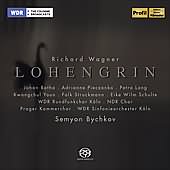This remarkably “alive” performance of Lohengrin was made after a couple of concert performances (we are told in the accompanying booklet) and it features the type of ensemble work and comfort that we associate with familiarity. Semyon Bychkov leads a performance with naturally flowing tempos: the lengthy exchange between Ortrud and Telramund has the sort of tension that might come from a couple who have known each other for so long and have a poisoned relationship; they snap at one another in real time. The Ortrud/Elsa scene in Act 2 is frighteningly seductive, the former knowing just how to “get” the latter. And the love music in the Bridal Chamber Scene–the only part of the score that Bychkov takes at a more leisurely that usual pace–is wonderfully sincere and sensual, with a build-up of nervousness that never seems plugged in. His orchestral texturing is transparent throughout, with the winds prominently featured and plenty of room for the brass to shine.
The WDR Sinfonieorchester plays superbly and each of the sections has great moments (the glistening Prelude!), while the overall effect is one of superb integration. In addition, Bychkov is incredibly sensitive to the singers’ needs. This is music-making of the highest order. And the cut in the Grail Narrative that we have become accustomed to has been re-opened here and completes the story.
The singing is as good or better than on any other available recording. I admit to never having enjoyed a performance by the South African tenor Johan Botha before; he’s clumsy on stage and, at least when I’ve heard him, has tended to sing everything with the same dramatic intent, albeit while scrupulously observing dynamic markings. Well, bravo to Bychkov if he is responsible for the stunning Lohengrin Botha sings on these discs: sensitive, tireless, other-worldly in those weird, introspective moments, potent and manly when called for, accompanied by crisp diction, exciting exclamation, and lyricism–all that one wants in a Lohengrin.
Adrianne Pieczonka’s Elsa is in a similar class. Her distinctive soprano easily manages Elsa’s strangeness, her misapprehension, her doubts, and her naiveté. She’s gorgeous in her opening narrative and in “Euch luften”, stronger in the Love duet and dark when she realizes what she’s done. She does not erase memories of Elisabeth Grümmer, but she’s splendid. Falk Struckmann delivers a mustache-twirling Telramund, angry and filled with self-hatred, and ferocious.
He is bettered by Petra Lang, whose Ortrud is perhaps the easiest sung available–most mezzos have to reach for the big notes in “Entweite Götter”; Lang is comfortable and secure. There’s snide malevolence in every note she sings, but fans of Christa Ludwig and Astrid Varnay will prefer a darker sound. Eike Wilm Schulte intones the Herald’s music with authority and Kwangchul Yuon is an impressive King. The chorus is superb throughout.
Audiophiles will revel in the sonics. Clear, big, and delineated, with marvelous resonance from the organ and lower strings and brilliance from the brass, we also get an ideal balance between voices and instruments. This is the finest Lohengrin to come along since Kempe’s. Highly recommended. [4/30/2009]
































